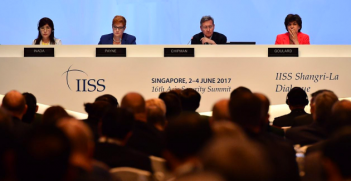Strategic Expectations of China’s Rise

What should the world – especially the West – expect from the rise of China? An important first step is to get used to hearing a distinctively Chinese voice on international issues.
Introduction: Influencing China?
How productive is it to question China’s handling (or mis-handling?) of some of China’s increasingly broad policy agenda? Given the obvious ambition of China’s “Belt and Road” initiative, accompanied by China’s greatly enhanced capacity to implement most of its agenda, these are probably matters that the outside world should not ignore. If the world wants China’s new strategic reach to be more compatible with long-trusted international norms, we are presumably seeking adjustments in Chinese policies, especially in areas where China’s interests and international interests intersect. This is neither a novel nor worrying notion; and some adjustment in Chinese objectives and methods need not be seen either as a defeat for China or as a victory for the West. Rather, it could mean identifying a more constructive and more useful articulation of important Chinese policies for the rest of the world. In summary, what are the prospects for international success in modifying China’s ambitions? Or modifying China’s behaviour as it affects the rest of the world?
We may need to reconsider some of our attitudes towards China, just as China may need to reconsider some of its policies. If China’s growing physical presence in the South China Sea really does make this region more dangerous, what alternatives are available? Would a Code of Conduct for all countries with an interest in the SCS really assist? If so, should China be pressured to adopt a more positive attitude to a Code of Conduct, which other international parties could adhere to? Is China really pursuing an “Axis of Authoritarianism” internationally with the Soviet Union? It is hard to see how the Shanghai Cooperation Organisation, sponsored by China, really represents some kind of effective equivalent of NATO in Europe, for example. And why does China’s handling of its Uighur minority in Xinjiang really constitute a major issue for the rest of the world, even if many countries, like Australia, give sanctuary to Uighurs?
Might China be a True Partner in the Pacific and Internationally?
China’s growing international influence – its strategic “rise” – naturally prompts the question of whether or not it might be a worthy partner in the Pacific and elsewhere. This question arises, in part, because China is obviously setting out to contest the dominance that the United States has exercised internationally since 1945. To answer the question, we should analyse the context very carefully. We should ask whether – and how – China might maintain a good balance between its own interests and capacities in the Pacific as well as globally. China’s genuine involvement in international affairs, including international regulatory systems, should reinforce aspirations for better outcomes in the world; but more principled behaviour by China may also be critical. China will need to convince other countries that it is prepared to stand up for international arrangements that are fair to all countries, that don’t just reward brute force or military power, and don’t reserve the benefits of international arrangements primarily for the richest and largest countries, or for Chinese communities.
China has already demonstrated that it can exercise restraint in the use of its power. Most importantly, it has conformed with international expectations in respect of nuclear non-proliferation (China has already subjected itself to international inspections under the International Atomic Energy Agency (IAEA) in order to comply with the Nuclear Non-Proliferation Treaty). It has also subjected itself to international norms in relation to the United Nations since becoming a member in 1972. It has also complied with the World Trade Organisation (WTO) and related treaties. Finally, it has conformed fully with international expectations in relation to Antarctica through the Antarctic Treaty of 1970.
What Should China Do Multilaterally?
China has already signed onto, and observes, most of the multilateral norms in force today. It has done so explicitly ever since it joined the United Nations formally in 1971. Separately, China has submitted to various independent inspections of its compliance with key international instruments, including the World Trade Organisation (WTO) from 2001 and the WTO’s subsidiary arrangement for Trade Related Intellectual Property measures (TRIPS), and trade related investment measures (TRIMS). In the arms control area, China adhered to the Comprehensive Test Ban Treaty (CTBT); the Nuclear Non-Proliferation Treaty (NPT) via routine inspections by the International Atomic Energy Agency (IAEA); the Biological Weapons Convention (1984); the Chemical Weapons Convention (CWC) 1997; the World Intellectual Property Organisation (WIPO) 1980; and the UN Trade and Development Agency (UNCTAD) and its Sustainable Development Goals (SDGs), formally adopted by the UN in 2015. China joined the Asia Pacific Economic Cooperation (APEC) arrangement in 1978.
China has also launched a number of its own multilateral initiatives such as the Shanghai Cooperation Organisations (SCO) and, famously, the Belt and Road initiative (BRI) as well as the Boao Forum initiative of 2001. While these initiatives have generally not been notably successful in terms of wide membership and concrete outcomes, they demonstrate a certain preparedness on the part of China to engage in outreach activities with its neighbours, to seek inclusive approaches to regional policy challenges, and to expose its own thinking to feedback from others.
China is also complying with several key regional programs, such as with ASEAN, the South Asia Regional Cooperation arrangement (SARC), and with the International Institute for Strategic Studies (IISS). China is also cooperating with BIMSTEC (the Bangladesh, India, Malaysia and Sri Lanka Technical Cooperation Program, as well as the East Asia Summit, an output of the ASEAN Summit process. These initiatives have also not been especially noteworthy, but nor have they been obvious failures. China has usually been an active rather than a passive participant in these bodies, gradually extending its multilateral skills and expertise over time. The head of the ANU Bell School of Asia Pacific Affairs has publicly noted the impact of Chinese legal thinking on international discussion of international law in a presentation by ANU Professor Toni Erskine at the AIIA Canberra in 2018.
However, China needs more adroit diplomacy if it wishes to win international support and sympathy – globally and regionally – for its new strategic presence. At the moment, China’s presence looks to be crudely opportunistic and narrowly focused on China’s commercial interests. Although it is reasonably transparent, including separate voluntary agreements with cooperating entities, little attention is paid by China to presenting the BRI network as bringing wider strategic benefits and being strategically sensitive to variable circumstances, let alone conforming with sound international legal and commercial practice. So China needs constantly to stress that any new arrangements will be sensitive to local circumstances, will not leave any cooperating parties worse off, or leave them economically disadvantaged. China needs to show that its commitments will be exemplary: they will conform with international best practice, will not involve taking advantage of intellectual property belonging to others, and they will not be premised on according Chinese parties undeserved pre-eminence. China needs to openly and honestly present a new model for international strategic partnerships if it expects greater recognition of its international status.
Conclusions
Inherently, there is no reason why China cannot become a worthy partner in the Pacific. It probably won’t have the same approach as the United States, some of whose actions in the Pacific were overtly hostile towards China. Geographically, China is not a distant country for Pacific Island states, many of whom also have resident Chinese communities. China would be well advised to avoid taking sides politically in the Pacific, to avoid involving Pacific Island countries in China’s strategic manoeuvres, and to keep its commercial activities separate from its international objectives in the Pacific.
China needs to pay any intellectual property fees it is liable for (as part of its commitment to joining the WTO). This should help counter criticisms of China over intellectual property “theft.”
The international community needs to become used to hearing a distinctive Chinese voice on important international issues. China itself needs to articulate more sophisticated guidelines for its own international engagement. For its part, China also needs to demonstrate that it is prepared to support arrangements and models that don’t simply advance narrow Chinese interests. In some situations, China might do well to develop effective cooperative arrangements with select international partners with whom it can identify. China needs to be bolder and more confident in articulating its own perspectives and its own rationale for its role. It is not necessarily useful to address these issues solely in terms of Australian “dependence” on China, as some in Australia have done recently.
So far, “like-minded” Western countries have tended to exclude China from their own engagement with the Pacific, although Pacific Island countries have not necessarily done this themselves; deeper Chinese involvement in existing regional multilateral arrangements might help, where these arrangements have proved effective. Recognising China’s right to be meaningfully involved in global rule-making and in decisions that guide the operation of the international system might also be essential.
Trevor Wilson is a Visiting Fellow at the Department of Political & Social Change at the Coral Bell School of Asia Pacific Affairs, College of Asia & the Pacific at the Australian National University.
This article is published under a Creative Commons Licence and may be republished with attribution.





